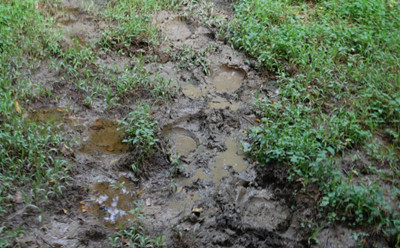(单词翻译:单击)
听力文本
This is Scientific American — 60-Second Science. I'm Jason Goldman.
Imagine a world without elephants. Not only would we have lost one of the planet's most charismatic, extraordinary creatures. Also gone would be a network of ecosystem engineers—because elephants are crucial for other creatures to exist.
They disperse seeds in their copious droppings. By literally cutting paths through forests as they trample trees and bushes, they create a more complex landscape. And now we know that their very footprints are important.
"We were walking through the forest in Kibale National Park…and that's when we stumbled upon these water-filled elephant footprints."
University of Koblenz–Landau ecologist Wolfram Remmers.
"And we looked at them and we quickly noticed that they were not only filled by water, but there were lots of animals living in them."
Remmers and his colleagues discovered that elephant footprints are a critical habitat for aquatic invertebrates like water beetles. The team studied 30 footprints in different parts of the national park in Uganda to see just who calls this unique habitat their home. In all, they found 61 species from 27 taxonomic orders.

The researchers then created 18 artificial footprints to see how fast they would be colonized. Water beetles showed up on day one. After five days, 410 individual invertebrates were occupying the prints. The findings are in the African Journal of Ecology.
"If you think of these footprints as tiny islands in a big forest, it was amazing to me to see how quickly these small animals could find them and colonize them and use them as habitat for foraging and reproduction and living."
In some places, elephant footprints are the only stagnant ponds to be found, which could mean that these insects depend on the pachyderms for their very survival. But because this discovery is so new, nobody really knows how critical these habitats are.
"We are not sure how much they are really dependent on elephant-made footprints in other areas, or if they would completely disappear or if they would just be there in a lower number."
Without additional protections, elephants will undoubtedly disappear from large swaths of their ranges. Which means a huge community of invertebrates might be severely restricted in their ability to move across the landscape—with ecosystem consequences we can only guess at.
Thanks for listening for Scientific American — 60-Second Science Science. I'm Jason Goldman.
参考译文
这里是科学美国人——60秒科学。我是杰森·古德曼。
想象一下没有大象的世界。我们不仅会失去世界上最有魅力、最独特的物种。同时,也会失去由生态系统工程师组成的网络,因为大象对其它生物的存在是至关重要的。
大象在粪便中散播种子。从字面上理解,大象在踩踏树木和灌木丛时,可以在森林中开创道路,这样它们就创造了一个更为复杂的景观。现在我们知道它们的脚印也是非常重要的。
“我们当时正在穿越基巴莱国家公园,然后我们偶然发现了积满水的大象脚印。”
沃尔夫拉姆·雷默斯是德国科布伦茨·兰道大学的生态学家。
“我们观察了一下这些脚印,然后我们很快就注意到脚印里面不仅仅有积水,还有许多小动物生活在里面。”
雷斯斯和他的同事发现,大象脚印是龙虱等水生无脊椎动物的重要栖息地。研究小组对乌干达国家公园中不同地方出现的30个大象脚印进行了研究,他们想知道有哪些生物把这个独特的栖息地当作了家。他们总共发现了27个分类中的61种生物。
然后研究人员制造了18个人工脚印,想看看这些脚印被寄居生物占领的速度会有多快。龙虱在第一天就出现了。5天后,410个无脊椎动物占领了这些脚印。该研究结果发表在《非洲生态学期刊》上。
“如果将这些脚印比喻为大森林中的小岛,让我惊讶的是,这些小动物们找到这些小岛并占领那里的速度是如此之快,然后它们会将这些小岛作为栖息地,在那里找寻食物、生殖繁衍并生存。”
在某些地方,大象脚印只是不流动的小池塘,这意味着这些昆虫要依靠厚皮动物生存下去。但是因为这点刚刚被发现,所以目前还没有人真正了解这种动物栖息地的重要性。
“我们还不确定在其他地区,它们对大象脚印的依赖性有多强,或者说如果这些脚印完全消失,或者数量减少的话,会发生什么事。”
没有额外的保护措施,大象必将大面积消失。这就意味着,一大群无脊椎动物也许会因为自身能力所限,不能大面积移动,我们也只能猜测这是大象脚印对生态系统的一些影响。
谢谢大家收听科学美国人——60秒科学。我是杰森·古德曼。
译文为可可英语翻译,未经授权请勿转载!
重点讲解
重点讲解:
1. stumble upon 意外发现;偶然看见;
例句:I stumble upon the rare book in a second-hand bookstore.
我在一家旧书店偶然找到这本珍贵的书。
2. in all 总共;合计;
例句:In all some 15 million people live in the selected areas.
总共有大概1,500万人住在所选定的区域内。
3. show up 出现;露面;
例句:I promise you that he will show up.
我向你保证他肯定会来的。
4. depend on 依靠;依赖;
例句:You may depend on the accuracy of the report.
你可以信赖报告的准确性。


